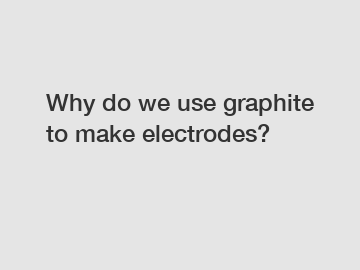Why do we use graphite to make electrodes?
Why do we use graphite to make electrodes?
Graphite is widely used in various industries for its unique properties, including its ability to conduct electricity. One of the most common applications of graphite is in the production of electrodes. In this article, we will explore the reasons why graphite is the preferred material for electrode manufacturing.
Conductivity:

Graphite is an excellent conductor of electricity due to its unique crystalline structure. Each graphite atom is bonded to three neighboring atoms, forming layers of carbon atoms arranged in a hexagonal lattice. This structure allows for the easy movement of electrons, enabling efficient electrical conductivity. Compared to other materials, such as metals, graphite exhibits lower resistance and higher stability when used as an electrode.
Chemical Stability:
Another important characteristic of graphite that makes it suitable for electrode production is its high chemical stability. When electrodes are used in various applications, they are often exposed to harsh environments and corrosive substances. Graphite has a high resistance to chemical reactions, making it ideal for withstanding such conditions without degradation. This stability ensures a longer lifespan for the electrodes, reducing the need for frequent replacements.
Low Friction and Heat Resistance:
In certain applications, electrodes experience significant friction and heat generation. Graphite has a unique property known as self-lubrication, which reduces friction and wear on the electrode. This property makes it particularly useful in applications such as arc furnaces and electric motor brushes, where constant movement and contact occur. Additionally, graphite can withstand high temperatures without significant deformation, making it a reliable choice for applications involving intense heat.
Versatility:
Graphite electrodes are used in a wide range of industries, including steelmaking, aluminum production, and electrochemistry. The versatility of graphite allows it to be molded into various shapes and sizes, depending on the specific application requirements. Its ability to be easily machined and customized makes it a highly preferred material for electrodes. Whether it is a large electrode for a steelmaking furnace or a small electrode for laboratory experiments, graphite can be tailored to meet different needs.
Cost-effectiveness:
Graphite electrodes are known for their cost-effectiveness. While graphite itself is not expensive, the manufacturing process to refine it into high-quality electrodes can be complex. However, due to the long lifespan and durability of graphite electrodes, they prove to be a cost-effective investment in the long run. The reduced need for frequent replacements and the superior performance of graphite make it a preferred choice for industries where electrodes play a crucial role.
Conclusion:
In conclusion, graphite is an exceptional material for the manufacturing of electrodes due to its high electrical conductivity, chemical stability, low friction, heat resistance, versatility, and cost-effectiveness. These properties make graphite electrodes suitable for numerous industries and applications. Whether it is used in steelmaking, aluminum production, or electrochemistry, graphite electrodes consistently deliver reliable performance and longevity. If you have any further questions or would like to explore the potential applications of graphite electrodes, please do not hesitate to contact us.
Contact us:
If you have any further questions or would like to explore the potential applications of graphite electrodes, please do not hesitate to contact us. We are here to assist you and provide you with the necessary information and support for your specific requirements.
If you want to learn more, please visit our website 400mm HP graphite electrode, 350mm HP graphite electrode application, 550mm HP Graphite Electrode.
274
0
0

Comments
All Comments (0)